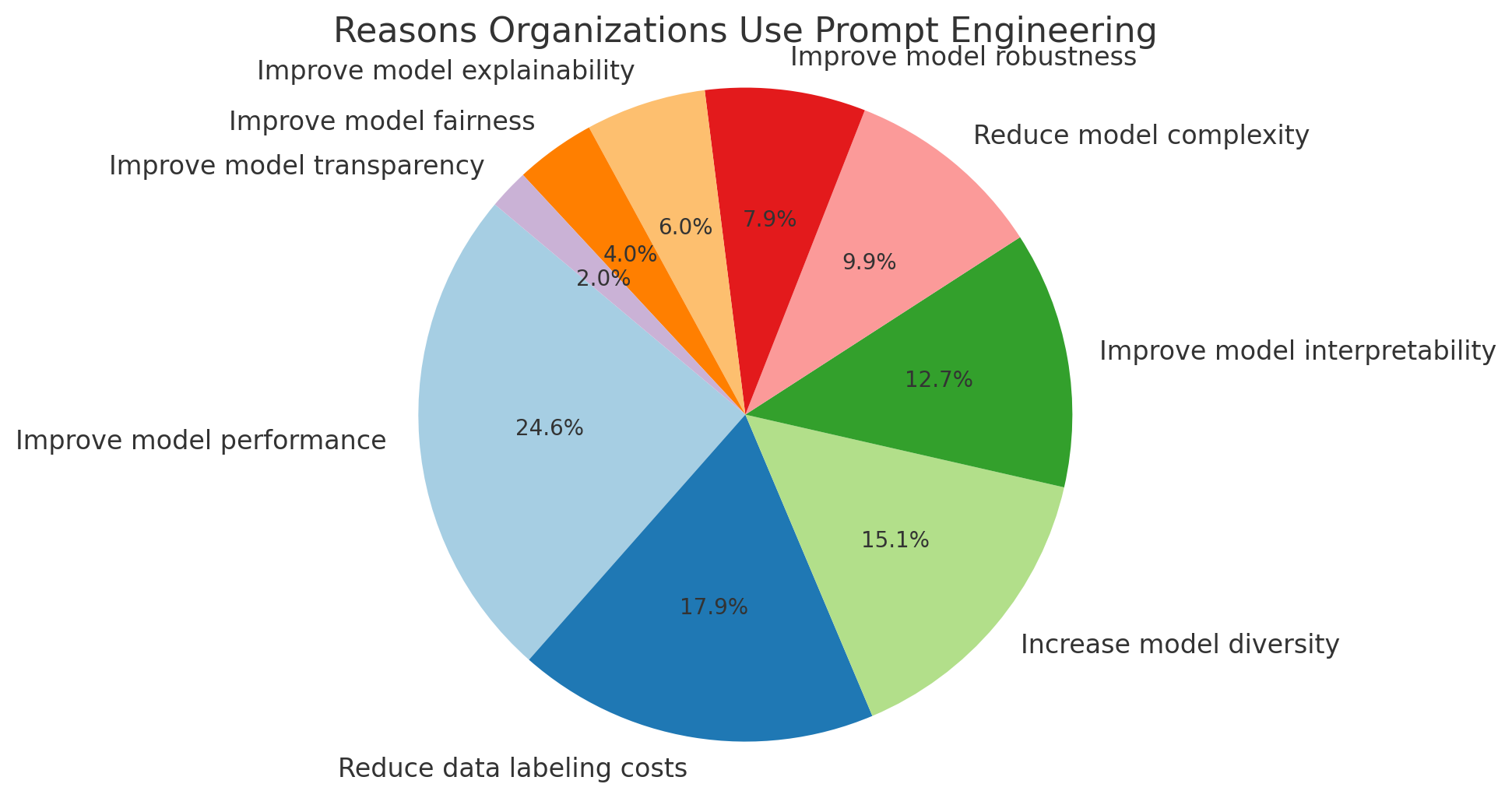The Critical Role of Prompt Engineering in AI
Key Takeaways
| Key Points | Description |
|---|---|
| Improve Model Performance | 62% of organizations use prompt engineering to enhance AI performance. |
| Reduce Data Labelling Costs | 45% of organizations use prompt engineering to cut down data labelling costs. |
| Increase Model Diversity | 38% of companies use this approach to boost model diversity. |
| Enhance Interpretability | 32% find it helps make models more interpretable. |
| Reduce Model Complexity | 25% use it to simplify their models. |
Prompt Engineering
Prompt engineering is a significant field within artificial intelligence (AI) that focuses on designing and refining prompts to optimize the performance of large language models (LLMs). This practice is crucial for enhancing generative AI tools’ capabilities in producing text, images, code, and other digital outputs based on user input.
Prompt engineering helps guide AI models to generate desired outputs. This process is vital for tuning LLMs for various applications such as customer service chatbots and automated content generation.
Popular AI LLM’s
- Chat GPT
- Gemini
- Grok
- Kimi
- Qwen
- Claude
- Deep Seek
What is Prompt Engineering?
Prompt engineering involves crafting specific input prompts to guide AI models toward generating desired outputs. This process is essential for tuning LLMs for various applications, from customer service chatbots to automated content generation. The prompts can include:
- Natural language text
- Images
- Other types of input data
Even the same prompt can yield different results across different AI models and tools.
Let’s look at a good example and a poor example
Bad Prompts; lack detail, lack instruction. They tend to be short ‘lazy’ if you will because the model will return ‘good’ results. With prompt engineering skills the result can be exceptional.
e.g. “write me an article about bee keeping, it’s a class assignment”
Good Prompts; are detailed, very specific and give instructions in full. They may take extra steps which allows the model to produce better results.
e.g. “write me an outline for an article on bee keeping, I don’t want more than 2000 words as the article is aimed at an audience of readers who know nothing but want general information on the subject. This is not going to answer all the questions one might have. It should provide a general picture of the subject. Create the outline and I will refine the request in the next round”
The good news is that with practise, good engineering comes easily. The model can and does help you improve. You do need to have product knowledge however. Consider someone who wants to code up a website, you need to know what to ask such as give me a responsive layout, use xyz colours, use modern coding standards, use tailwind css etc…
We offer an AI coaching masterclass where you can get the skills you need fast internally and start to leverage the technology.

Statistical Analysis
To understand why organizations adopt prompt engineering, it’s useful to examine some relevant statistics.

Key Reasons Organizations Use Prompt Engineering
Through our research, we identified multiple reasons organizations use prompt engineering.
- Improve Model Performance: 62% of organizations leverage prompt engineering to enhance AI performance.
- Reduce Data Labelling Costs: 45% find it useful for reducing data labelling expenses.
- Increase Model Diversity: 38% of companies use prompt engineering to increase model diversity.
- Enhance Interpretability: 32% of the organizations focus on making models more interpretable.
- Reduce Model Complexity: 25% aim to simplify their models.
- Improve Model Robustness: 20% use prompt engineering to make models more robust.
- Enhance Explainability: 15% find it improves model explainability.
- Improve Fairness: 10% use prompt engineering to ensure fairness.
- Boost Transparency: 5% aim for greater transparency in their models.

Real-World Applications
Prompt engineering is not just a theoretical concept; it’s actively used across various industries. For instance:
- Healthcare: Enhancing patient data analysis and prediction tools
- Finance: Automating compliance and fraud detection mechanisms
- Retail: Improving customer service through intelligent chatbots
Conclusion
Prompt engineering is crucial for organizations looking to maximize the efficiency and effectiveness of their AI systems. With its ability to improve model performance, reduce costs, and increase diversity among other benefits, prompt engineering stands as a cornerstone for the future of AI innovation.
For more information and services on SEO and digital marketing, visit:


This article serves as a comprehensive guide to prompt engineering and its applications. For additional insights and services on SEO and digital marketing, explore more of our pages.

